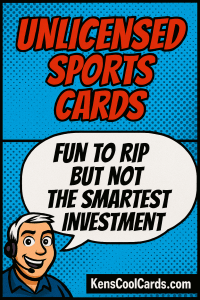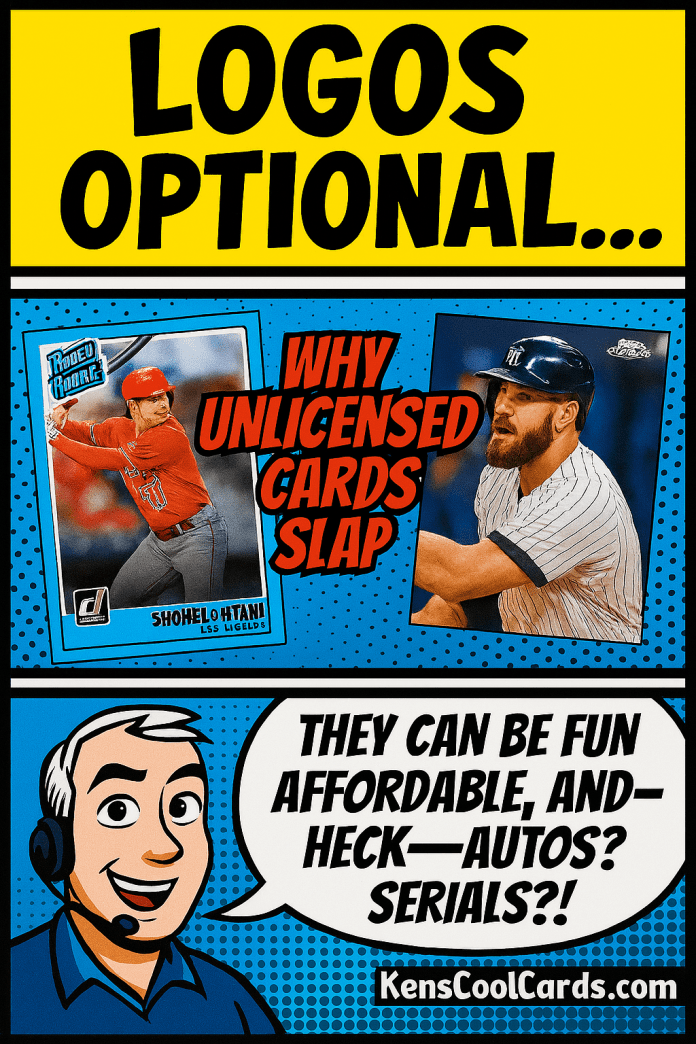Let’s get this out of the way: ripping packs is fun. Unlicensed cards—like Donruss MLB or Topps NFL—can be cool, creative, and packed with value. Autos, serial-numbered hits, slick parallels, and player-first designs? Absolutely. But if you’re investing in sports cards long-term, buying unlicensed packs to rip is not the smartest play. It’s fun. It’s not worthless. But it’s inefficient.
⚾ What Are Unlicensed Sports Cards?
Unlicensed cards are produced by companies that have rights to use player likenesses—but not team logos, uniforms, or league trademarks. Think:
- Donruss MLB (Panini has player rights, but not MLB logos)
- Topps NFL (Topps has player rights, but not NFL licensing)
You’ll see players in generic jerseys, no team branding, and sometimes awkward cropping to avoid logos. But don’t write them off just yet.
🎉 Why Unlicensed Cards Still Slap
- Creative Design: Panini and Topps go wild with inserts, parallels, and foil treatments. Sets like Donruss Optic, Topps Fire, and Chronicles deliver eye candy that rivals licensed products.
- Affordable Entry Point: Unlicensed packs are cheaper to rip. That means more fun, more hits, and less risk—especially for new collectors or kids.
- Player-First Focus: If you collect based on players—not teams—unlicensed cards still deliver. You’ll find rookies, stars, and legends with solid photography and clean layouts.
- Autos and Serials: Yes, you can pull autos. Yes, you can hit low-numbered parallels. Some of these cards do hold value—especially in niche markets or PC builds.
- Content Goldmine: For sellers and creators, unlicensed cards are great for storytelling. Meme-style posts, player spotlights, and SEO-rich listings all benefit from their unique look.
💎 A Smart Play for Your PC or Favorite Stars
Let’s be honest: not everyone’s dropping four figures on a Topps Chrome auto. That’s where unlicensed cards shine. Suppose you’re building a personal collection (PC) or chasing cards of elite players like Shohei Ohtani, Paul Skenes, or Aaron Judge. In that case, unlicensed products offer a realistic way to get in the game.
It’s sort of like chasing the 1959 Fleer Ted Williams set. While it was licensed, it wasn’t Topps—and that made it a budget-friendly way to own cards of the same era, condition, and legend without paying Topps premiums. If you wanted a clean Williams card from the late ’50s, Fleer was just easier on the wallet. Same logic applies here.
🔍 Real-World Price Comparisons
| Player | Licensed Rookie Auto (Topps Chrome) | Unlicensed Auto (Panini Stars & Stripes) |
|---|---|---|
| Shohei Ohtani | 2018 Topps Chrome – Shohei Ohtani Pitching #150 – (RC) PSA 10 |
|
| Paul Skenes | 2024 Topps Chrome Update #RA-PS Paul Skenes Rookie Auto On-Card Pirates RC – ~$415–$725 raw | |
| Aaron Judge | 2017 Topps Chrome RC – ~$650 (PSA 10) | 2017 Donruss Optic RC – ~$40–$75 raw |
These aren’t knockoffs—they’re real cards, often with autos, serial numbers, and eye-catching designs. You’re just trading logos for affordability.
🧠 Ken’s Tip
- Stack stars you couldn’t otherwise afford
- Build rainbow parallels or player-specific themes
- Create content with cards that pop visually, even if they’re not “investment-grade”
📉 The Investment Reality
- Lower Resale Value: Collectors want logos. Logos = legitimacy. Unlicensed cards often sell for a fraction of their licensed counterparts.
- Limited Demand: Serious investors and flippers tend to avoid logoless cards. They’re harder to grade, harder to comp, and less likely to spike in value.
- Pack-Ripping Is Inefficient: If you’re investing, ripping packs is the least efficient strategy. Buying unlicensed packs to rip? Even less so. Fun? Yes. Smart? Not really.
🧠 Ken’s Take: Strategic Use in the Hobby
At KensCoolCards, we don’t hate unlicensed cards. In fact, we use them all the time—for content, branding, and storytelling. They’re great for:
- Player-first listings with SEO-rich descriptions
- Visual content that pops on social and eBay
- Creative branding that breaks the mold
But we’re also honest: if you’re building a portfolio or chasing ROI, licensed singles and graded cards are the way to go.
✅ Final Word: Know Your Goal
Unlicensed cards aren’t junk. They’re fun, flashy, and full of potential—if you know what you’re doing. Just don’t confuse “cool to rip” with “smart to invest.”
Want to explore logoless legends or build a player-first PC? We’ve got the cards, the content, and the clarity to help you do it right.

